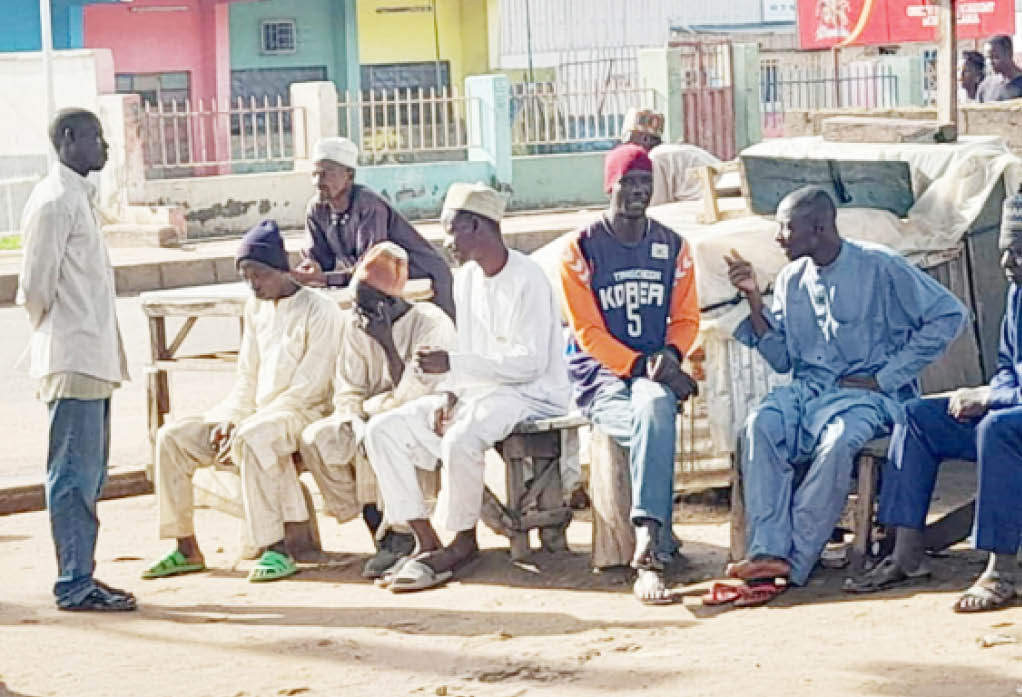How insecurity reduced Kaduna farmers to beggars
In view of persistent banditry, leading to frequent destruction of farmlands and razing of communities in some parts of Giwa Local Government Area of Kaduna State, farmers have continued to suffer great setback. Daily Trust Saturday gathered that most of the affected farmers have been reduced to beggars as they roam the streets, while others […]

Some of the farmers around Dadi motor park in Kwangila, Sabon Gari, Zaria
In view of persistent banditry, leading to frequent destruction of farmlands and razing of communities in some parts of Giwa Local Government Area of Kaduna State, farmers have continued to suffer great setback. Daily Trust Saturday gathered that most of the affected farmers have been reduced to beggars as they roam the streets, while others move about in search of menial jobs.
In the last six months, bandits have razed down 9 villages, including Dillalai, Zangon Tama, Barebari and Anguwar Bakko, as well as destroyed many farmlands, thereby relegating the onetime agriculturally rich communities.
It was gathered that residents of about 20 villages, comprising Kadanya, Durumi, Tudun Amada, Gidan Alhajin Kida and Tama, had fled, abandoning their farmlands to the mercy of the invading bandits.
The Kaduna State police command had in March confirmed that an attack on one of the communities had claimed the lives of 30 people and about 100 cattle rustled.
Malam Dayyabu Barebari, a once large-scale farmer in Giwa, said his village had been reduced to a ghost town as residents have fled due to high level of insecurity. He said the bandits had taken over Giwa’s largest farming area.
“Giwa West is renowned for production of varieties of food, including rice, maize, soybeans and millet. But with the present spate of insecurity, one can predict shortage of food in the next harvest season. I alone used to harvest more than 500 bags of rice, maize, millet and soybeans at the end of every farming season,” he said.
Barebari, who has been displaced from his village, now roams the streets in search of a means of survival.
“I am not the only one, there are others who used to cultivate a thousand bags of various farm produce but we are all here roaming the streets in search of a means of survival.
“We fled from various villages and have been going from one relative to another, seeking assistance. Some of us visit mosques and wait to solicit for aid after congregational prayers,” he said.
He said a number of displaced farmers had relocated to relatively safe communities like Giwa town, Shika, Yakawada and Dan mahawayi.
Barebari, who couldn’t hold back tears, said he had taken the risk of returning to inspect his village few days ago and realised that the 30 bags of fertiliser he stored in order to start the year’s farming had been stolen. “I am now left without money and farm input,” he said.
Also speaking, Malam Mukhtar Kago from Galadimawa ward said the issue of farming this year was completely unattainable as bandits had taken over their farmlands. He said more than 50 large-scale farmers were roaming the streets of Giwa town and other communities.

Malam Sani Mai Aljihu also said, “We sometimes engage in menial jobs. Some farmers hire us to work for them, which is giving us succour.”
He, however, said only few of them got such opportunities as most major farmers already had labourers who had been working with them for years.
Daily Trust Saturday gathered that some of the farmers left their wives and children in various internally displaced persons (IDP) camps while they roam the streets in search of jobs.
In order to feed their families, Mai Aljihu said they were sometimes forced to beg because the camps largely depended on donations from either the local government or philanthropists.
Ibrahim Tama, another displaced farmer, said they were not lazy, but the present situation forced them into making the difficult choice of sometimes begging for food and money.
“This is why, in any mosque you go to, you would find that there are some of us standing and waiting. Immediately after each prayer, we start to solicit for alms. We are also at motor parks and marketplaces seeking assistance. However, if we get any small work, we happily do it,” he said.
‘Food shortage looms’
An agronomist in the Ahmadu Bello University, Zaria, Dr Sule Ladan, has raised the alarm over possible food shortage due to insecurity in most food-producing communities in Kaduna State.
He said unless something tangible was quickly done, Kaduna may not be listed among agriculturally viable states in the near future.
“I want to urge the government to go back to the drawing table and chart plans that will augment the agricultural backwardness of the farming communities in the state. These farmers who were chased away by bandits must quickly be assembled and rehabilitated, while alternative farmlands with inputs and implements should be provided to remedy the situation,” he suggested.
On his part, a patron to the Maize Farmers Association in Kaduna State, Alhaji Salisu Mai Masara, described the situation in Giwa Local Government Area as pathetic, saying the once rich farming communities had been reduced to dependants. He added that the communities used to provide a large chunk of assorted commodities annually, which made Kaduna State and the country proud.
“It is unfortunate that this harvest year, the state may suffer a huge deficit, especially in maize farming as over 40 per cent of the maize produced in the state used to come from that area. More pathetic is the present condition of farmers who have been reduced to beggars,” he said.
He, therefore, appealed to both the state and local governments to provide an alternative means of survival to farmers in order to save the state and the country from food crisis.
